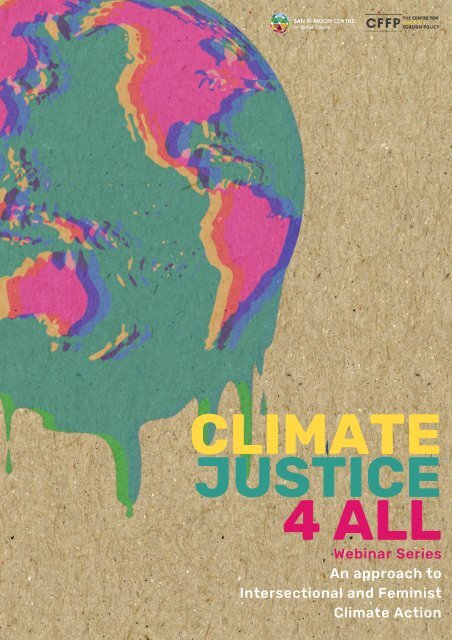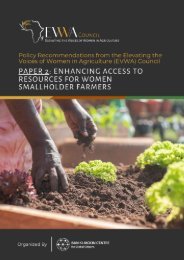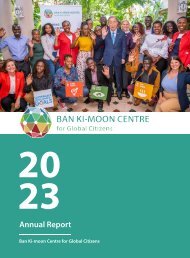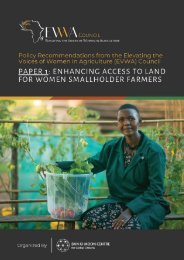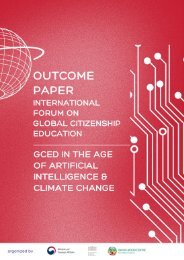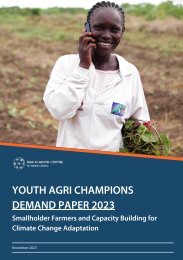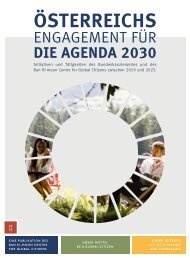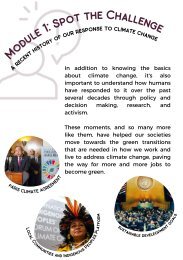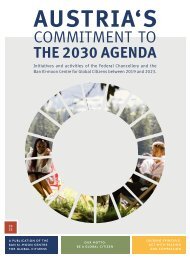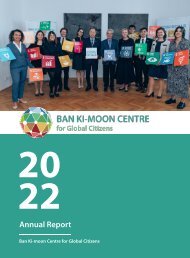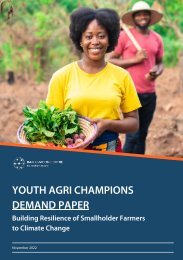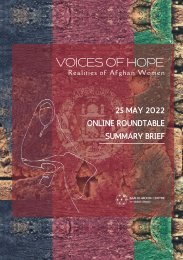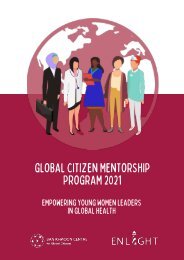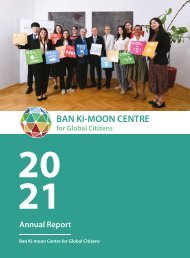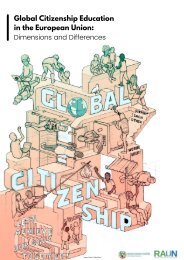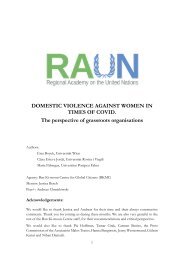Policy Brief - Climate Justice 4 All
You also want an ePaper? Increase the reach of your titles
YUMPU automatically turns print PDFs into web optimized ePapers that Google loves.
CLIMATE<br />
JUSTICE<br />
4 ALL<br />
Webinar Series<br />
An approach to<br />
Intersectional and Feminist<br />
<strong>Climate</strong> Action
CLIMATE JUSTICE 4 ALL - AN APPROACH TO INTERSECTIONAL AND<br />
FEMINIST CLIMATE ACTION<br />
<strong>Policy</strong> <strong>Brief</strong><br />
This publication is a joint project of the Centre for Feminist Foreign <strong>Policy</strong> and<br />
the Ban Ki-moon Center for Global Citizens. 2021, all rights reserved.<br />
AUTHORS<br />
Sheena Anderson and Jessica Besch<br />
EDITORS<br />
Damjan Denkovski, Monika Froehler, Katrin Harvey and Annika Kreitlow<br />
LAYOUT DESIGN<br />
Katre Olmez<br />
PROOFREADING<br />
Jenny Brown<br />
SUGGESTED CITATION<br />
Centre for Feminist Foreign <strong>Policy</strong>, Ban Ki-moon Centre for Global Citizens<br />
(2021). <strong>Climate</strong> <strong>Justice</strong> 4 <strong>All</strong> - An Approach to Intersectional and Feminist<br />
<strong>Climate</strong> Action. <strong>Policy</strong> <strong>Brief</strong>. Available at: https://bankimooncentre.org/CJW4ALL<br />
DISCLAIMER<br />
“<strong>Climate</strong> <strong>Justice</strong> 4 <strong>All</strong> - An Approach to Intersectional and Feminist <strong>Climate</strong><br />
Action" was a series of seven webinars throughout 2021 that aimed to empower<br />
activists, academia, policymakers, and civil society in using climate advocacy<br />
and implementation strategies in the framework of the Sustainable Development<br />
Goals (SDGs) through an intersectional feminist lens. The goal was to open the<br />
floor to as many people as possible so that different voices can be heard, but<br />
also to heighten awareness of topics usually avoided or of which many are<br />
simply not aware.<br />
The webinar series was supported by the Austrian Federal Ministry of <strong>Climate</strong><br />
Action, Environment, Energy, Mobility, Innovation and Technology and the RELX<br />
SDG Resource Hub.<br />
REFERENCES<br />
1 / Agostino, Ana; Lizarde, Rosa (2012). Gender and <strong>Climate</strong> <strong>Justice</strong>. In: Harcourt,<br />
Wend (ed.). Women Reclaiming Sustainable Livelihoods: Spaces Lost, Spaces<br />
Gained, 1st ed. New York: Palgrave Macmillan, p. 257-265<br />
2 / Friends of the Earth Europe (2019). <strong>Climate</strong> justice – in depth. Friends of the<br />
Earth. http://www.foeeurope.org/climate-justice-in-depth
POLICY<br />
BRIEF<br />
Prepared by<br />
Ban Ki-moon Centre for Global Citizens and<br />
the Centre for Feminist Foreign <strong>Policy</strong><br />
Supported by
INTRODUCTION<br />
The climate crisis brings forth inherent<br />
global injustices with already marginalized<br />
groups bearing the brunt of rising sea<br />
levels, droughts, and pollution. The<br />
realities of people experiencing climate<br />
change first-hand are often overlooked.<br />
Women and children, Black, Indigenous,<br />
and People of Color (BIPoC), LGBTQIA+<br />
communities, people with disabilities, and<br />
many more lack a seat at environmental<br />
decision-making and negotiation tables.<br />
By acknowledging structural inequalities,<br />
we want to lay the groundwork for<br />
intersectional and effective climate action<br />
that benefits all.<br />
1.1. What is the issue?<br />
The climate crisis is in full swing. As many<br />
states fail to find the right ways to tackle<br />
this emergency and barely manage to<br />
adhere to the goals agreed upon in the<br />
Paris Agreement, it is (young) climate<br />
activists, civil society, and academia that<br />
drive the fight against climate change. <strong>All</strong><br />
over the world, youth are protesting and<br />
demanding that those in power make<br />
climate-just decisions that will provide a<br />
better future for the next generations<br />
while implementing sustainable and<br />
effective policies for climate mitigation<br />
and adaptation.<br />
Furthermore, it has primarily been<br />
marginalized people that have given<br />
warnings about the climate crisis and<br />
very early on connected it to our ways of<br />
living, to everyday struggles of people,<br />
and to our relationship with nature. Yet,<br />
due to the marginalization of e.g.<br />
indigenous knowledge through systemic<br />
racism, entire perspectives and bodies of<br />
work are barely heard or valued within<br />
the dominant paradigm. Despite being<br />
the sector of society that has historically<br />
contributed the least to the causes of<br />
climate change, BIPoC continue the fight<br />
for climate justice at the frontlines. This is<br />
an injustice that can only be rectified by<br />
swift and ambitious climate action that<br />
puts achieving climate justice first. In<br />
achieving climate justice, the<br />
international community needs to be as<br />
inclusive, as creative, and as fast as<br />
possible. <strong>All</strong> over the globe, people from<br />
different backgrounds are already<br />
coming together, forming alliances, and<br />
finding alternative ways of knowing and<br />
adjusting to the changing climate and its<br />
impacts. It is the goal of this policy<br />
briefing to highlight these collective<br />
efforts and shine a light on these diverse<br />
climate activists and their different<br />
approaches to climate justice.<br />
1
1.3. About the webinar series<br />
1.2. Our understanding of <strong>Climate</strong><br />
<strong>Justice</strong><br />
“The concept of climate justice emerged<br />
as a result of introducing a rights<br />
approach to the challenges posed by<br />
climate change” (Agostino/Lizarde 2012,<br />
257). It can also be defined as “addressing<br />
the climate crisis whilst also making<br />
progress towards equity and the<br />
protection and realisation of human<br />
rights” (Friends of the Earth Europe 2019).<br />
We understand climate justice as an<br />
inherently intersectional concept and<br />
goal. This take on climate justice offers a<br />
holistic view of the intertwined issues and<br />
challenges the international community<br />
faces. Thus, climate justice means racial,<br />
social, environmental, economic, and<br />
health justice, and, in striving for it, we<br />
must always apply an intersectional<br />
perspective that keeps all these issues in<br />
mind as one interconnected system.<br />
<strong>Climate</strong> justice puts people and their<br />
relationship to nature at the heart of the<br />
issue and fights for a sustainable and<br />
healthy planet for all.<br />
Over the course of eight months in 2021,<br />
the Centre for Feminist Foreign <strong>Policy</strong><br />
(CFFP) and the Ban Ki-moon Centre for<br />
Global Citizens (BKMC) have jointly<br />
conducted a series of seven webinars,<br />
each focusing on analyzing and offering<br />
intersectional feminist approaches to<br />
climate justice in the framework of the<br />
Sustainable Development Goals (SDGs).<br />
The topics ranged from theories of<br />
intersectionality and Feminist Foreign<br />
<strong>Policy</strong> to marginalized climate activism<br />
and the role of art and culture in tackling<br />
climate injustice. Each webinar<br />
introduced one or more experts on the<br />
various topics, enabling a broad and rich<br />
conversation between activists,<br />
scientists, policymakers, and people who<br />
care about our endangered planet. We are<br />
proud to have welcomed inspirational<br />
powerhouses such as Nisreen Elsaim,<br />
Hindou Oumarou Ibrahim, Mitzi Jonelle,<br />
David Lammy, Mary Robinson, and many<br />
others to our webinars. The audience and<br />
the organizers have benefited hugely<br />
from their expertise. This policy briefing<br />
aims to compile their knowledge and<br />
make it available to everyone because we<br />
know we will only achieve climate justice<br />
with shared efforts.<br />
In this briefing, each session and its key<br />
takeaways will be summarized, leading to<br />
seven clear demands for the international<br />
community.<br />
2
WEBINAR I:<br />
THEORY & GROUNDWORK<br />
The first webinar with Dr. Priscilla<br />
Achakpa, Founder and Executive Director<br />
of the Women Environmental Programme<br />
(WEP), focused on the climate crisis<br />
beyond global warming and the need to<br />
produce less carbon dioxide, emphasizing<br />
how the climate crisis works as a<br />
multiplier of inequality.<br />
It aimed to highlight the importance of<br />
fostering climate justice from a truly<br />
intersectional perspective: tackling racial,<br />
social, economic, health, and<br />
environmental injustice together, thus<br />
providing the groundwork for an<br />
intersectional, inclusive, and peoplecentered<br />
approach to the climate<br />
emergency.<br />
Dr. Achakpa explained the concept of<br />
intersectionality and the very<br />
intersectional manifestations of the<br />
climate crisis. She drew attention to the<br />
crucial role of women in the climate<br />
discourse, explored how we can achieve<br />
intersectional climate justice, and<br />
introduced the work of WEP, a nongovernmental<br />
and nonprofit voluntary<br />
organization with headquarters in Burkina<br />
Faso, Nigeria, Togo, Tunisia, and the<br />
United States.<br />
KEY TAKEAWAYS FROM THE WEBINAR<br />
An intersectional analysis of the climate<br />
crisis focuses on how social categories<br />
such as gender, race, socio-class,<br />
physical ability, sexual orientation,<br />
religion, and other aspects of our<br />
identity interact at various levels, thus<br />
contributing to discrimination,<br />
exclusion, social inequality, and<br />
systemic injustice.<br />
Globally and locally, the climate crisis<br />
specifically impacts people who are<br />
already marginalized.<br />
Women are vital to building climate<br />
resilience in communities because they<br />
are often well acquainted with what<br />
their communities want and need.<br />
New international alliances among<br />
disparate actors and social movements<br />
are required to deliver more<br />
transformative versions of climate<br />
justice.<br />
Dr. Priscilla Achakpa<br />
We need a global movement of climate<br />
change feminists to continue<br />
advocating for solutions from a<br />
gendered perspective.<br />
3
WEBINAR II:<br />
FROM THEORY TO PRAXIS<br />
This webinar explored how to get<br />
environmental demands onto<br />
governmental decision-making tables and<br />
discussed challenges and opportunities in<br />
the implementation of inclusive and<br />
climate-friendly action.<br />
The speakers highlighted successful<br />
climate justice projects and programs and<br />
spoke about social justice within the<br />
climate movement. With our guests,<br />
Kavita Naidu, International Human Rights<br />
Lawyer and Member of the Women &<br />
Gender Constituency, UNFCCC, and David<br />
Lammy, Shadow Secretary of State for<br />
<strong>Justice</strong> in England, the participants<br />
discussed best practices and overcoming<br />
challenges.<br />
Lammy elaborated on environmental<br />
racism and the way it targets BIPoC. He<br />
urged people to recognize who has been<br />
hit hardest by the climate crisis and not<br />
be color-blind in finding solutions.<br />
David Lammy<br />
Naidu introduced the work of the Asia<br />
Pacific Forum on Women, Law, and<br />
Development (APWLD), which amplifies<br />
grassroots voices in 27 countries. She<br />
further explained the need for spaces for<br />
women and marginalized communities to<br />
share their success stories and truly be<br />
heard.<br />
KEY TAKEAWAYS FROM THE WEBINAR<br />
Black people need to breathe again:<br />
matters of racial and climate justice must<br />
not be separated.<br />
We cannot invest in the very system that<br />
led to the climate crisis in the first place.<br />
Patriarchal, neoliberal, capitalist systems<br />
are engineered in a way that<br />
discriminates against women and other<br />
marginalized groups.<br />
<strong>Policy</strong>makers need to realize that climate<br />
change has an impact on health,<br />
economies, peace, and security.<br />
We need feminist advocacy by<br />
developing grassroots activism and<br />
demanding accountability and justice.<br />
Kavita Naidu<br />
There is a need to decolonize university<br />
and school curricula and provide young<br />
people with leadership power to take on<br />
the challenge of the climate crisis.<br />
4
WEBINAR III:<br />
FEMINIST FOREIGN POLICY<br />
& CLIMATE JUSTICE<br />
This webinar discussed the<br />
implementation of international climate<br />
agreements with an intersectional<br />
feminist approach and further touched<br />
upon Feminist Foreign <strong>Policy</strong> as a means<br />
to rebalance power inequalities in the<br />
fight against the climate crisis.<br />
Concrete examples from Nalubega’s work<br />
in Uganda and Robinson’s international<br />
career were shared, and they exchanged<br />
strategies on keeping your cool, staying<br />
focused, and taking care of your wellbeing<br />
in an ever-challenging<br />
environment.<br />
In her keynote, Mary Robinson, former<br />
President of Ireland and Adjunct Professor<br />
for <strong>Climate</strong> <strong>Justice</strong> in Trinity College<br />
Dublin, highlighted the relationship<br />
between the climate crisis and gender.<br />
She shared her experience on how the<br />
debate about the climate crisis has<br />
changed over the past decades from a<br />
very technical to a justice issue.<br />
In the subsequent conversation together<br />
with Dorothy Nalubega, the Ugandan<br />
Human Rights Activist and Founding<br />
Chairperson of the East African Greens<br />
Women’s Network, the two experts<br />
discussed why climate and gender are<br />
inseparable.<br />
Dorothy Nalubega<br />
Mary Robinson<br />
KEY TAKEAWAYS FROM THE WEBINAR<br />
There are several injustices within the<br />
climate crisis: racial injustice, gender<br />
injustice, intergenerational injustice,<br />
transitional injustice, and, of course,<br />
injustice to nature itself.<br />
There continue to be heavy imbalances<br />
between all genders at a local and<br />
global level when it comes to the<br />
climate crisis as a security threat.<br />
There is an urgent need for more<br />
intergenerational dialogue.<br />
In order to achieve climate justice,<br />
people must work together - there will<br />
be no success without joint effort.<br />
Passion, hope, and the will to include as<br />
many people as possible are values not<br />
to be underestimated in the fight for<br />
climate justice.<br />
5
WEBINAR IV:<br />
CONNECTING THE SDGS TO<br />
CLIMATE ACTION<br />
This webinar discussed how the<br />
interconnectedness of the 17 SDGs helps<br />
to apply a holistic view to the climate<br />
emergency. It also specifically looks at the<br />
role of indigenous and LGBTQIA+<br />
communities in the implementation of the<br />
SDGs.<br />
A Ban Ki-moon Centre SDG Micro-Project<br />
presentation demonstrated a “think<br />
glocal” approach when tackling the<br />
climate crisis through the SDGs.<br />
Hindou Oumarou Ibrahim, President at the<br />
Association for Indigenous Women and<br />
Peoples of Chad and UN SDG Advocate,<br />
shared how indigenous people’s lives are<br />
linked to nature and that we need to<br />
tackle all 17 SDGs together and with the<br />
same effort in order to not leave anyone<br />
behind.<br />
Ruvimbo Samanga, BKMC Global Citizen<br />
Scholar and Founder of AgriSpace,<br />
elaborated on the situation in Zimbabwe.<br />
She introduced her SDG Micro-Project<br />
that developed into a startup.<br />
Finally, Martin Karadzhov, Executive Board<br />
Member at ILGA World and Young Leader<br />
for the SDGs, explained how climate<br />
justice and queer rights are connected<br />
and that it is more important than ever to<br />
fight multiple and intertwined crises.<br />
Hindou<br />
Oumarou Ibrahim<br />
KEY TAKEAWAYS FROM THE WEBINAR<br />
We need to bring back the momentum<br />
and fully focus on the climate crisis.<br />
Young people are acting and sharing<br />
their vision of the world.<br />
Martin Karadzhov<br />
We only have this one planet, and we<br />
need to act together to protect it<br />
properly.<br />
Queer people need to be valued,<br />
listened to, and included in climate<br />
justice discourses.<br />
Ruvimbo Samanga<br />
We need radical reforms to adapt to the<br />
climate crisis and alternative ways of<br />
knowing.<br />
6
WEBINAR V: ENVIRONMENTAL<br />
RACISM & BIPOC CLIMATE<br />
ACTIVISM<br />
This BIPoC-only seminar created a safe<br />
space for BIPoC climate activists, focused<br />
on environmental racism, and placed<br />
BIPoC at the forefront of many climate<br />
movements and struggles. BIPoC are<br />
among the most vulnerable groups when<br />
it comes to the climate crisis, yet they are<br />
often also found at the front lines. With<br />
our panelists, Chido Nyaruwata, Kiana<br />
Kazemi, and Mitzi Jonelle, we learned<br />
more about the deep roots and effects of<br />
environmental racism, how BIPoC<br />
knowledge can teach us about and guide<br />
us towards climate justice, and shared<br />
experiences among young BIPoC climate<br />
activists who are already leading the way.<br />
Chido Nyaruwata<br />
Kiana Kazemi<br />
Mitzi Jonelle<br />
Chido Nyaruwata, an Afro-feminist<br />
Researcher, Consultant, and Digital<br />
Storyteller, drew attention to the<br />
intersection of climate and gender justice<br />
and what it means to be an African<br />
activist, knowing that the continent has<br />
contributed little to the climate crisis but<br />
is now greatly feeling its impacts.<br />
Kiana Kazemi, an Environmental <strong>Justice</strong><br />
Advocate and Intersectional Engineer,<br />
shared details about starting her own<br />
community-based and -led activism and<br />
organization.<br />
Mitzi Jonelle, Convenor and International<br />
Spokesperson of Youth Advocates for<br />
<strong>Climate</strong> Action Philippines (YACAP),<br />
highlighted how climate activists in the<br />
Philippines fear for their lives; she<br />
highlighted the many diverse ways of<br />
becoming an activist.<br />
KEY TAKEAWAYS FROM THE WEBINAR<br />
Some people might not even identify as<br />
activists, but their existence and<br />
survival are resistance.<br />
BIPoC communities do not need<br />
reckoning when it comes to racism<br />
because racial injustice is their reality;<br />
they are facing intersectional<br />
oppression all the time but still keep on<br />
fighting for justice.<br />
We often fail to see how marginalized<br />
people, like women, BIPoC, and gender<br />
non-conforming people, interact with<br />
the environment.<br />
Community care is self-care.<br />
There is a need for safe spaces for<br />
BIPoC to come together and understand<br />
what can be learned from each other;<br />
uplifting each other is essential.<br />
7
WEBINAR VI:<br />
ART AND CLIMATE<br />
This webinar acknowledged the<br />
intersections of art, activism, creativity,<br />
and environmental justice for effective<br />
climate awareness strategies. The<br />
panelists discussed art and design-based<br />
methods to engage more people in the<br />
climate discourse and reimagine our<br />
relationship with nature.<br />
The third panelist, Henry McGhie,<br />
Founder of Curating Tomorrow and<br />
Member of Reimagining Museums for<br />
<strong>Climate</strong> Action, explained how<br />
museums can offer different concepts<br />
of understanding and communicating<br />
the climate crisis.<br />
Yessenia Funes, Environmental <strong>Justice</strong><br />
Journalist and <strong>Climate</strong> Editor at Atmos,<br />
spoke about how the media has failed to<br />
communicate the climate crisis from a<br />
human-centered perspective.<br />
Finn Harries, Co-Founder of Earthrise<br />
Studio, elaborated on using creativity to<br />
communicate the climate crisis to target<br />
climate curious people.<br />
KEY TAKEAWAYS FROM THE WEBINAR<br />
Yessenia Funes<br />
Museums are places where people have<br />
the possibility to participate as people<br />
and not as consumers.<br />
Urgent action is required but so is<br />
optimism that we can change the<br />
system.<br />
Finn Harries<br />
Henry McGhie<br />
It is essential to center diverse voices in<br />
the discourse, like those of the queer<br />
and BIPoC communities.<br />
It is about people - a focus on climate<br />
justice shows exactly that.<br />
We need to tell stories and narratives<br />
that can change people’s position<br />
towards the climate crisis.<br />
8
WEBINAR VII:<br />
INSPIRATION TALK &<br />
COMMUNITY STRENGTHENING<br />
The seventh and final webinar took the<br />
discussion back to the very heart and<br />
focus of this webinar series: the crucial<br />
and immensely important work and voices<br />
of young climate activists all over the<br />
world, who are finding alternative and<br />
various ways to tackle the climate crisis.<br />
This peer exchange sought to promote<br />
climate advocacy and implementation<br />
strategies. It was about learning from<br />
young people, bringing a feeling of<br />
community to the forefront, and offering<br />
a space for solidarity.<br />
The webinar started with creative tools<br />
gathering insights from the participants<br />
on questions such as their expectations<br />
for COP26 in Glasgow and<br />
recommendations when feeling anxious<br />
about the future and climate crisis.<br />
Following that, the webinar offered a<br />
panel discussion with Nisreen Elsaim,<br />
<strong>Climate</strong> Activist and Chair of the UN<br />
Secretary-General’s Youth Advisory Group<br />
Nisreen Elsaim<br />
Anna Fiesinger<br />
Jannie Staffansson<br />
on <strong>Climate</strong> Change; Anna Filsinger, Marine<br />
Biologist and Speaker for Students for<br />
Future; and Jannie Staffansson, Saami<br />
Activist promoting indigenous people’s<br />
rights and climate activism.<br />
Elsaim shared her experiences with<br />
ageism in regards to her expertise in<br />
climate negotiation spaces. Fiesinger<br />
explained how universities, particularly in<br />
Germany, offer insufficient curricula in<br />
terms of addressing the climate crisis and<br />
should assist in mobilizing young people.<br />
Staffansson raised awareness of the<br />
struggles of indigenous people in Europe<br />
and the fact that indigenous<br />
representatives are missing at an EU level.<br />
KEY TAKEAWAYS FROM THE WEBINAR<br />
Storytelling can be an effective tool in<br />
raising awareness and doing advocacy<br />
work.<br />
<strong>Climate</strong> activism is energy-consuming,<br />
financially consuming, and mentally<br />
consuming, so getting enough rest and<br />
sleep is crucial.<br />
Schools and universities must<br />
increasingly engage in conversations<br />
around climate justice and encourage<br />
students to participate.<br />
Many young people are not only<br />
activists but peacebuilders and conflict<br />
preventers; they offer resilience and<br />
plenty of community strengthening.<br />
Making allies with women in positions of<br />
power to support the important voices<br />
on the ground is vital.<br />
9
SUMMARY<br />
This project centered on community<br />
efforts and diverse forms of climate<br />
action. It sought to bring together young<br />
climate activists from all over the world to<br />
think about ways to achieve intersectional<br />
feminist climate justice in the framework<br />
of the SDGs. The outcome was seven<br />
insightful webinars highlighting just a few<br />
of the leading, diverse, and important<br />
voices at the forefront of climate activism<br />
and providing a way of coming together,<br />
exchanging experiences, and joint<br />
learning.<br />
It is crucial not to lose momentum and to<br />
continue empowering, promoting, and<br />
highlighting climate activists’ hard work.<br />
Implementing and achieving the Paris<br />
<strong>Climate</strong> Agreement goal of limiting the<br />
temperature increase to 1.5°C above preindustrial<br />
levels requires time and<br />
everyone’s efforts to not only act and<br />
stand up for nature but also to rethink our<br />
relationship with the earth that we<br />
inhabit. In the end, we have to make the<br />
climate crisis an issue of justice.<br />
As organizers of the webinars, we<br />
acknowledge that we have much to learn<br />
and a long way to go - but that we all<br />
have a responsibility and a role to play in<br />
achieving climate justice. It was and is our<br />
common goal to offer platforms<br />
and spaces to bring feminist activists,<br />
policymakers, and academia together to<br />
find alternative ways of knowing and<br />
learning, all hopefully leading to more<br />
inclusive solutions to the climate crisis,<br />
based on the needs of the most<br />
marginalized.<br />
GETTY IMAGES<br />
10
GENERAL DEMANDS TO THE<br />
INTERNATIONAL COMMUNITY<br />
DERIVED FROM ALL SEVEN<br />
WEBINARS<br />
These demands are the outcome of all<br />
seven webinars over the course of eight<br />
months. They constitute the results of a<br />
global learning experiment, an<br />
intergenerational exchange, intersectional<br />
feminist perspectives, diverse and<br />
marginalized climate activism, the<br />
promotion of the SDGs, and knowledge<br />
based on the everyday experiences of<br />
people.<br />
Foster and support international<br />
alliances between climate activists,<br />
especially with a feminist and<br />
people-centered perspective.<br />
Accelerate the strengthening of<br />
international law in terms of climate<br />
justice, addressing ecocide,<br />
protecting people and the<br />
environment from reckless leaders<br />
and their damaging short-sighted<br />
policies, and, finally, valuing<br />
indigenous communities and their<br />
land.<br />
Include women and vulnerable<br />
groups at the forefront of climate<br />
justice decision making.<br />
Make it a legally binding promise to<br />
not risk a generation with no voice in<br />
the future.<br />
Appreciate and listen to the voices of<br />
marginalized climate activists,<br />
especially BIPoC activists leading the<br />
way, and think of alternative ways of<br />
achieving climate justice that<br />
protect the people and the planet.<br />
Be creative in changing the very<br />
institutions that maintain the status<br />
quo and challenge political elites who<br />
are sustaining their power instead of<br />
sharing it.<br />
Adopt an equity approach and<br />
perspective when tackling the<br />
climate crisis - it is essential to<br />
understand the issue of<br />
disproportionate power structures,<br />
especially with regards to the Global<br />
North.<br />
11
CONTACT<br />
Ban Ki-moon Centre for Global Citizens<br />
P.O. Box 0018, 1037, Vienna, Austria<br />
Email: office@bankimooncentre.org<br />
Centre for Feminist Foreign <strong>Policy</strong> GmbH<br />
Anklamer Straße 38 10115 Berlin, Germany<br />
Email: hello@centreforffp.org
CLIMATE<br />
JUSTICE<br />
4 ALL


